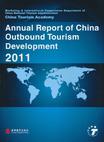中国出境旅游发展研究报告2011
2011-3
旅游教育出版社
中国旅游研究院
216
182000
In 2010, China leapt to become the world's third largest
inbound tourist host-eountry and Asia's largest outbound tourist
source-country, with a per capita trip rate of 1.5 times, and a
direct employment of 13.5 million people. Tourism consumption
contributed over 10% of the total society, and the tourism industry
showed its growing and positive role in China's economic and social
development.
Chapter One An Overview of the Development of China's
Outbound Tourism in 2010
Section I :The Main Features of China's Outbound Tourism
Market in 2010
1.1 The outbound tourism market expanded significantly due to
continuous improvement of the macro environment
1.2 Outbound tourism destinations remained steady with small
changes and the travel to Taiwan continued to heat up
1.3 Obviously promoted by shopping, consumption grew on a
large-scale
1.4 The market characteristics of aging emerged and the Internet
served as a major channel for information and reservations
1.5 Outbound tourist satisfaction has improved significantly
compared with 2009
Section II :Main Features of the Business Operation of
Outbound Tourism in 2010
2.1 The scale of outbound travel agencies remained in stable
condition, and their business operation remained outstanding
2.2 A national market speeds up to take shape, and region-wide
competition accelerates the market evolution
2.3 Substantial progress has been made in opening up to foreign
travel agencies, and domestic travel agencies will improve quality
through orderly competition
2.4 The entrusted-agent system is being orderly implemented on
the base of pilot experiments throughout the country, which will
quicken the pace of the changing industrial development mode
2.5 The tourism industry chain extension is being accelerated,
and group development boosts the differentiation of the strong and
the weak
Chapter Two Environmental Analysis of China Outbound Tourism
Market in 2010
Section I : Impact of Domestic Environment
……
Chapter Three Operating Characteristics of China Outbound
Tourism Industry in 2010
Chapter Four Market Structure and Consumption Characteristics
of China Outbound Tourism in 2010
Chapter Five Researching on Major Tourist Source
Markets
Chapter Six Development Trends and Recommendations for
China's Outbound Tourism in 2011
版权页:插图:(4) "Going out" proceeds slowlyIn light of Beijing, "going out" still proceeds slowly. One important constraint hasbeen the lack of understanding about destination countries and personnel qualified to workin a foreign environment. Moreover, joint venture travel agencies in destination countrieshave resource advantages. This means direct competition against those travel agencies. Inaddition, tourist sources are affected by external factors. Overseas Subsidiaries faceuncertainties in business volume. Therefore, travel agencies prefer strategic cooperationwith travel groups in destination countries to reduce risks of bridging by capital.1.4.3.2 Basic Tendency of the Industry in Beijing(1) Accelerated development of self-guided outbound toursBeijing Hua Yuan International Travel Co. , Ltd. states that some of package touristsare choosing semi-self-guided tourists now. This lays the foundation for the completetransition to self-guided tourism in the future. Self-guided Taiwan tours may become a newmarket niche for the outbound tourism markets. Better communication between mainlandtourists and Taiwan residents and greater awareness of Taiwan add to tourists' growingdemand for self-guided tours.
《中国出境旅游发展研究报告(2011)》由旅游教育出版社出版。

看着象正版,应该是正版